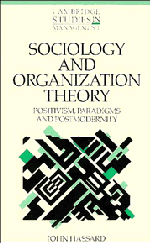Book contents
- Frontmatter
- Contents
- List of figures and tables
- Acknowledgements
- Introduction
- 1 Foundations of orthodoxy
- 2 The hegemony of systems
- 3 From functionalism to fragmentation
- 4 Closed paradigms and analytical openings
- 5 Multiple paradigm research
- 6 Postmodernism and organization
- Notes
- Bibliography
- Author index
- Subject index
- Cambridge Studies in Management
5 - Multiple paradigm research
Published online by Cambridge University Press: 03 May 2011
- Frontmatter
- Contents
- List of figures and tables
- Acknowledgements
- Introduction
- 1 Foundations of orthodoxy
- 2 The hegemony of systems
- 3 From functionalism to fragmentation
- 4 Closed paradigms and analytical openings
- 5 Multiple paradigm research
- 6 Postmodernism and organization
- Notes
- Bibliography
- Author index
- Subject index
- Cambridge Studies in Management
Summary
To translate a theory of worldview into one's own language is not to make it one's own. For that one must go native, discover that one is thinking in, not merely translating out of, a language that was previously foreign.
(Kuhn 1970a, p. 204)Introduction
Pondy and Boje (1981) suggested that ‘organization theory is faced with a frontier problem … how to conduct inquiry based on several paradigms’ (p. 84). A few years later, Donaldson commented ‘it is easy to write of the virtues of multi-level analysis … It is quite another thing to do this in practice’ (1985, pp. 284-5). In this chapter, we take up the challenge of employing a range of paradigms within one research investigation. Specifically, we develop a multiple paradigm study of work organization.
The chapter outlines a research programme in which the multiple paradigm model of Burrell and Morgan (1979) was used to conduct an empirical analysis of work behaviour in the British Fire Service. Insight into the organization was gained through using the four Burrell and Morgan paradigms as empirical frames of reference. Results were obtained through using a theory and method from each paradigm as the basis for research. Details of the fieldwork are given, research findings are presented, and the validity of the method is discussed.
- Type
- Chapter
- Information
- Sociology and Organization TheoryPositivism, Paradigms and Postmodernity, pp. 88 - 110Publisher: Cambridge University PressPrint publication year: 1993
- 1
- Cited by



